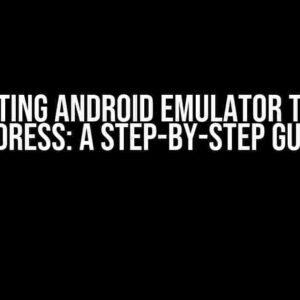Are you tired of using Android Studio for your Android development needs? Or maybe you’re looking for a change of pace and want to explore other options? Whatever your reason, you’re in luck! There are several alternative ways to develop Android apps without using Android Studio. In this article, we’ll explore some of the best options available.
The Need for an Alternative
Android Studio is a powerful and popular integrated development environment (IDE) for Android app development. However, it’s not the only option available. Some developers may find Android Studio too resource-intensive, while others may not like its user interface or may be looking for a more lightweight alternative. Whatever the reason, having an alternative to Android Studio can be beneficial for developers.
Why Look for an Alternative?
Here are some reasons why you might want to look for an alternative to Android Studio:
-
Resource-intensive: Android Studio can be slow and resource-intensive, especially for lower-end computers.
-
Complex user interface: Android Studio has a steep learning curve, which can be overwhelming for beginners.
-
Limited customization: Android Studio’s user interface can be customized to some extent, but it may not be enough for some developers.
-
Dependency on Java: Android Studio requires Java to be installed on your computer, which can be a limitation for some developers.
Alternative Options for Android Development
Fortunately, there are several alternative options for Android development that don’t require Android Studio. Here are some of the best options available:
IntelliJ IDEA
IntelliJ IDEA is a popular IDE developed by JetBrains, the same company that created Android Studio. It’s a more lightweight alternative to Android Studio and offers many similar features.
Here are some benefits of using IntelliJ IDEA:
-
Faster performance: IntelliJ IDEA is generally faster than Android Studio, making it a great option for developers who value speed.
-
More customization options: IntelliJ IDEA offers more customization options than Android Studio, making it easier to tailor the IDE to your needs.
-
Support for multiple languages: IntelliJ IDEA supports a wide range of programming languages, including Java, Kotlin, and Python.
Eclipse
Eclipse is another popular IDE that can be used for Android development. It’s an open-source project that’s been around for many years and has a large community of developers behind it.
Here are some benefits of using Eclipse:
-
Open-source: Eclipse is an open-source project, which means it’s free to use and customize.
-
Large community: Eclipse has a large community of developers who contribute to the project and provide support.
-
Flexible: Eclipse is a flexible IDE that can be used for a wide range of development projects, including Android app development.
Visual Studio Code
Visual Studio Code (VS Code) is a popular code editor developed by Microsoft. It’s a lightweight, open-source editor that’s highly customizable and can be used for Android development.
Here are some benefits of using VS Code:
-
Lightweight: VS Code is a lightweight code editor that’s fast and responsive.
-
Highly customizable: VS Code is highly customizable, with a wide range of extensions available to enhance its functionality.
-
Open-source: VS Code is an open-source project, which means it’s free to use and customize.
cordova
Cordova is a popular framework for building hybrid mobile apps using web technologies such as HTML, CSS, and JavaScript.
Here are some benefits of using Cordova:
-
Cross-platform: Cordova allows you to build apps that run on multiple platforms, including Android and iOS.
-
Easy to learn: Cordova is relatively easy to learn, even for developers without prior mobile app development experience.
-
Faster development: Cordova allows for faster development times, thanks to its use of web technologies.
Getting Started with Alternative Android Development
Now that we’ve covered some of the alternative options for Android development, let’s take a closer look at how to get started with each one.
IntelliJ IDEA
To get started with IntelliJ IDEA, follow these steps:
-
Download and install IntelliJ IDEA from the official JetBrains website.
-
Launch IntelliJ IDEA and create a new project by selecting “Android” as the project type.
-
Follow the prompts to create a new Android project, including selecting the SDK version and target device.
-
Once the project is created, you can start coding using IntelliJ IDEA’s intelligent code editor.
Eclipse
To get started with Eclipse, follow these steps:
-
Download and install Eclipse from the official Eclipse website.
-
Launch Eclipse and create a new project by selecting “Android” as the project type.
-
Follow the prompts to create a new Android project, including selecting the SDK version and target device.
-
Once the project is created, you can start coding using Eclipse’s code editor.
Visual Studio Code
To get started with VS Code, follow these steps:
-
Download and install VS Code from the official Microsoft website.
-
Launch VS Code and install the Android extension by clicking on the “Extensions” icon in the left sidebar.
-
Once the extension is installed, create a new folder for your Android project and open it in VS Code.
-
Start coding using VS Code’s code editor, and use the Android extension to compile and run your app.
Cordova
To get started with Cordova, follow these steps:
-
Download and install Cordova from the official Cordova website.
-
Create a new Cordova project using the command-line interface (CLI).
-
Start coding using HTML, CSS, and JavaScript, and use Cordova’s command-line tools to compile and run your app.
-
Once your app is complete, use Cordova’s built-in tools to build and deploy your app to the Google Play Store.
Conclusion
Android Studio is a popular IDE for Android app development, but it’s not the only option available. IntelliJ IDEA, Eclipse, Visual Studio Code, and Cordova are all viable alternative options that offer unique benefits and features. By exploring these alternative options, you can find the best fit for your Android development needs and take your app development skills to the next level.
Remember, the key to successful Android app development is to choose the right tools for the job. Experiment with different IDEs and frameworks to find what works best for you, and don’t be afraid to try new things. Happy coding!
<code></code>
<table>
<tr>
<th>IDE</th>
<th>Features</th>
<th>Pros</th>
<th>Cons</th>
</tr>
<tr>
<td>IntelliJ IDEA</td>
<td>Faster performance, more customization options</td>
<td>Faster, more customizable</td>
<td>Steeper learning curve</td>
</tr>
<tr>
<td>Eclipse</td>
<td>Open-source, flexible</td>
<td>Open-source, flexible</td>
<td>Outdated interface</td>
</tr>
<tr>
<td>Visual Studio Code</td>
<td>Lightweight, highly customizable</td>
<td>Lightweight, customizable</td>
<td>Limited AndroidFrequently Asked Question
If you're tired of Android Studio and want to explore alternative ways for Android development, you're in the right place! Here are some questions and answers to get you started:
What are some alternative IDEs for Android development?
There are several alternative IDEs for Android development, including IntelliJ IDEA, Visual Studio Code, and NetBeans. Each of these IDEs offers a unique set of features and plugins that can enhance your development experience.
Can I use a text editor for Android development?
Yes, you can use a text editor for Android development! While it may not offer the same level of convenience as an IDE, a text editor can be a lightweight and flexible option. You'll need to use the Android SDK command-line tools to compile and build your app.
What about online code editors for Android development?
Online code editors like Repl.it, CodeAnywhere, and CodePen can also be used for Android development. These platforms offer a cloud-based environment where you can write, compile, and run your code without the need for a local IDE or text editor.
Can I use a build automation tool for Android development?
Yes, you can use a build automation tool like Gradle or Maven to automate the build process for your Android app. These tools can be used in conjunction with a text editor or online code editor to streamline your development workflow.
Are there any specific requirements for Android development without Android Studio?
Yes, to develop Android apps without Android Studio, you'll need to have the Android SDK installed on your system, as well as a Java Development Kit (JDK) and a code editor or IDE of your choice. You'll also need to manually configure your project structure and dependencies.


